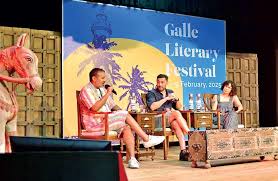
By Chanaka De Silva
The recently concluded Galle Literary Festival (GLF), held from February 6-9, 2025, has been hailed as a significant success, solidifying its reputation as a premier international event for Sri Lanka.
Considering the dismissive attitude that GLF founder Geoffrey Dobbs reportedly held towards the ‘hoi polloi’ of this country, along with allegations of misappropriated tsunami donations, it is unsurprising that concerns have arisen regarding the festival’s governance. Questions persist about who controls this event and whether appropriate taxes are paid for this significant occasion. As Sri Lanka increasingly becomes a hub for international events, it’s crucial to assess how the GLF contributes to the nation’s cash-strapped economy.
Despite the festival’s sold-out status, concerns persist about the transparency of its financial dealings, prompting inquiries into whether audits are conducted.
In the aftermath of Independence Day celebrations, which emphasize liberation from colonial rule, it is disheartening to observe that the Galle Literary Festival (GLF) appears to be reintroducing colonial-like attitudes.
Given the Galle Literary Festival’s prominence and substantial sponsorship from local businesses, it is imperative for organizers and the self-appointed literati to emphasize the importance of respectful attitudes toward local patrons.
Notably, while the event attracts a significant number of foreign attendees, a considerable portion of the audience comprises locals who can afford the tickets.This approach will only honor the diverse audience that supports the festival and uphold the legal standards set forth by Sri Lankan authorities.
The Galle Literary Festival (GLF) is intended to promote Sri Lanka’s rich cultural heritage and should serve as an inclusive platform for all citizens. Segregating local attendees not only contradicts the festival’s mission but also violates Sri Lanka’s constitutional provisions against discrimination.
Compounding these issues, a video that went viral recently showed a woman at a handicraft shop in close proximity to the festival premise, dismissing local patrons by stating that the establishment exclusively serves tourists.
The incident involves a vendor’s abusive behavior reflecting poorly on the broader community of merchants, who are among the primary beneficiaries of events like the Galle Literary Festival.
However, the emergence of this viral video capturing such conduct has brought the issue into sharper focus.
For instance, the incident involving a woman vendor threatening to inform the police against local customers raises concerns about discriminatory practices. It is essential to verify whether any ‘sell to only foreigners’ licenses have been granted by local authorities, as such practices could lead to future scenarios, where establishments will display ‘Foreigners Only’ signs.
Sri Lanka’s Consumer Affairs Authority Act, No.9 of 2003, explicitly prohibits discriminatory practices among traders. Section 8(d) of the Act empowers consumers to seek redress against unfair trade practices or any form of exploitation by traders. Therefore, any attempt to exclude local patrons not only undermines the inclusive spirit of the festival but also violates national consumer protection laws.
Article 12 of the Sri Lankan Constitution guarantees equality before the law and prohibits discrimination based on race, religion, language, caste, sex, political opinion, or place of birth.
It is imperative to unequivocally acknowledge the respect owed to local tourists, who have been instrumental in sustaining the tourism industry during challenging times such as wars, tsunamis, and the COVID-19 pandemic.Unfortunately, this is not an isolated case where similar occurrences have been reported, albeit infrequently.
Therefore, any actions that exclude or marginalize local participants are not only unethical, but also unlawful.
Therefore, it is also imperative that the GLF organizers ensure that future event remain accessible and welcoming to all, reflecting the nation’s commitment to equality and cultural celebration.





glad that you bought up the foreigners only issue and published the video of the disgusting woman , it is a fact that there are more than enough ppl who advertise on booking dot com as forigners only , one place is kandy calm residence , they have marked their place as closed on google but running bussiness as usual on booking as kandy calm residnce (forigners only) i have reched out to authorities including SLTDA ,& CAA, but not ven recived an acknowldgement yet